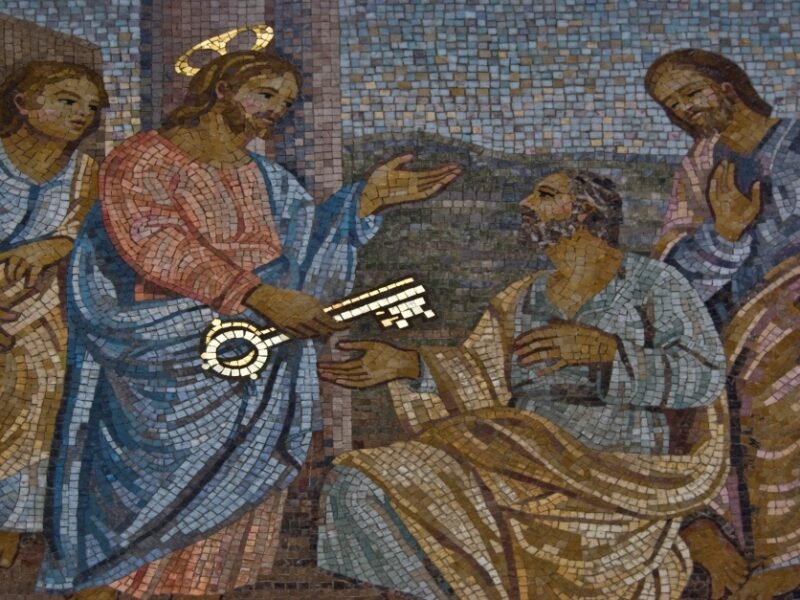The term “concupiscence” is obscure these days, little discussed or even understood by contemporary Christians. It therefore seems appropriate to dwell on it and clarify its meaning, given that the account of original sin contained in Article IX hinges on how the term is defined. “Concupiscence” is a synonym for “lust,” which in this sense is not confined to illicit sexual desire, but refers to any fleshly desire. This is evident in the KJV translation of Romans 7:7–8, in which Paul says, “I had not known sin, but by the law: for I had not known lust, except the law had said, Thou shalt not covet. But sin, taking occasion by the commandment, wrought in me all manner of concupiscence. For without the law, sin was dead.” Thus we find that concupiscence and lust are one and the same. As a result of the Fall, every human is afflicted with concupiscence as one of the effects of original sin. This much is generally agreed to be catholic teaching.
The dispute arises over whether concupiscence, i.e., the desire for sin, is itself sin. Roman Catholics have held since the Council of Trent that concupiscence is “not true and proper sin, but was so termed because it ariseth from sin and inclineth to it,” as Browne writes. In contrast, Article II of the Lutheran Augsburg Confession says that concupiscence is “truly sin, even now condemning and bringing eternal death upon those not born again through Baptism and the Holy Ghost.”[1] The Westminster Confession agrees with Augsburg on this point: “This corruption of nature, during this life, doth remain in those that are regenerated; and although it be through Christ pardoned and mortified, yet both itself and all the motions thereof are truly and properly sin.”[2] Browne identifies the Lutheran article as “the source from which our own ninth Article was derived,” with the relevant portion of Article IX reading as follows:
This infection of nature doth remain, yea, in them that are regenerated; whereby the lust of the flesh, called in Greek ϕρόνημα σαρκὸς, which some do expound the wisdom, some sensuality, some the affection, some the desire of the flesh, is not subject to the law of God. And although there is no condemnation for them that believe and are baptized, yet the Apostle doth confess that concupiscence and lust hath of itself the nature of sin.
The nature of concupiscence comes into play with regard to the question of how it is that those who have not committed personal sins (e.g., infants) also “deserveth God’s wrath and damnation,” as the Article says. Browne mentions the theory—held by some medieval scholastics and many Calvinists—that Adam’s sin is imputed to his descendants, but he notes that the Article does not address it: “There is nothing said in the Ninth Article on the imputation of Adam’s guilt, though that was a favourite subject of scholastic discussion.”[3] Browne, for his part, believes that the answer to the question lies in concupiscence:
The conclusion is, that every person born into the world has a sinful nature and a sinful heart, which, though it have not broken out in acts of sin, yet constitutes him a sinner, so that he may be said to “have sinned;” and that, on this account, he is liable to death, whether by death be meant death of the body, or death of the soul. It appears to me that our Church takes this view of the subject, and so follows closely on the teaching of St. Paul.
Some Anglicans have maintained that when the Article says concupiscence “hath of itself the nature of sin,” this should not be taken to mean concupiscence is sin properly speaking. For example, Francis J. Hall argues that this phrase should be understood as saying that “our present natural condition is caused by sin—not by our sin, but by Adam’s—and tends thereto,”[4] which is to say the Tridentine understanding of concupiscence is correct. Here Browne’s discussion of the biblical evidence in support of the view that “lust and sin seem to be identified” is helpful.[5] It is also worth noting that Nowell’s Catechism—which, upon publication in 1570, was required to be taught in schools, and from which the Prayer Book Catechism is derived—contains the following question and answer regarding the tenth commandment, “Thou shalt not covet”:
M. How then? Dost thou say that unadvised and sudden desires, and short thoughts that come upon the very godly, are sins, although they strive against such, rather than yield to them?
S. Surely it is plain that all corrupt thoughts, although our consent be not added to them, do proceed of our corrupted nature. And it is no doubt that sudden desires that tempt the hearts of men, although they prevail not so far as to win a stedfast assent of mind and allowance, are in this commandment condemned by God as sins. For it is meet that even in our very hearts and minds should shine before God their most perfect pureness and cleanness. For no innocency and righteousness but the most perfect can please him, whereof he hath also set before us this his law a most perfect rule.[6]
A primary objection to an account of original sin in which concupiscence is itself sin is that such an account entails the barbaric conclusion that infants who die unbaptized will suffer eternal damnation. Hall, in particular, thinks one of the chief benefits of the Tridentine understanding of concupiscence is that he can dismiss this notion as “an accretion which requires no defense on our part.”[7] The short response is that this conclusion is not logically required, as our own Anglican tradition shows. The longer response can be heard directly from those who have answered this noxious charge. Bishop Joseph Hall:
That the contempt of Baptism damneth is past all doubt; but, that the constrained absence thereof should send infants to hell, is a cruel rashness. It is not their sin to die early: death is a punishment, not an offence, an effect of sin, not a cause of torment. They want nothing but time, which they could not command. Because they could not live a while longer, that therefore they should die everlastingly, is the hard sentence of a bloody religion.[8]
Bishop White:
If it fall out inevitable that new born babes, descending of Christian parents, cannot receive this Sacrament, not only Protestants, but the ancient Church itself, and discreeter Papists, have thought it more pious to hope of God’s indulgence towards such infants, than to aggravate His vengeance with such rigour and extremity as the Trent Fathers and their disciples do.[9]
Lest this be considered a form of special pleading, Archbishop Bramhall points out that circumcision, the Old Testament typological precursor to baptism, was commanded by God to be performed on the eighth day. Are we to suppose, he asks, that infants who died before the eighth day were damned as a result of observing God’s command?
That the Jewish children might be saved without Circumcision is thus proved by the institution of God. Circumcision was not celebrated till the eighth day after the nativity; but many thousand Jewish infants died before the eighth day, and consequently without Circumcision; to exclude all those from hope of salvation for want of Circumcision, which by God’s own ordinance they might not have, intrencheth too much upon the goodness of God. More particularly, David’s child died upon the seventh day, and yet David doubted not to say, I shall go to him, but he shall not return to me. David could not go to him either in Hell or in Limbus Infantum.[10]
Such mitigation of Augustine’s unduly harsh opinion on this point is not confined to the Anglican tradition. John Calvin writes that “children who happen to depart this life before an opportunity of immersing them in water, are not excluded from the kingdom of heaven.”[11]
Let it be clear, then, that to say concupiscence is inherently sinful does not commit us to an account of original sin that is cruel or inhumane. Rather, the very logic of Scripture leads us so to understand concupiscence, for as Browne says with reference to Galatians 5:17, “We can hardly understand how the lusts of the natural man should be opposed to the Spirit of God, and yet be sinless.”[12]
Notes
- Book of Concord, “Augsburg Confession,” Article II, https://bookofconcord.org/augsburg-confession/original-sin/. ↑
- “Westminster Confession,” ch. VI, sec. V, https://thewestminsterstandard.org/the-westminster-confession/#Chapter%20VI. ↑
- For a general overview of approaches to the doctrine of original sin, see Thomas H. McCall, Against God and Nature: The Doctrine of Sin (Wheaton, IL: Crossway, 2019), 149‒206. ↑
- Francis J. Hall, Anglican Dogmatics: Francis J. Hall’s Dogmatic Theology, ed. John A. Porter, vol. 1, Bk. V. Creation & Man (Nashotah, WI: Nashotah House Press, 2021), 630, italics original. See also Alfred G. Mortimer, Catholic Faith and Practice, pt. I, 5th ed. (New York: Longmans, Green, and Co., 1905), 41–42. ↑
- On the inherent sinfulness of concupiscence, see J. Veneer, An Exposition of the Thirty Nine Articles of the Church of England, 2nd ed., vol. I (London: C. Rivington, 1734), 261‒62; T. Waite, Sermons, Explanatory and Practical, on the Thirty-Nine Articles of the Church of England (London: Baldwin, Cradock, and Joy, 1826), 158; William Beveridge, An Exposition of the Thirty-Nine Articles of the Church of England (London: James Duncan, 1830), 289 note g; and George Tomline, Elements of Christian Theology, 14th ed., vol. II (London: T. Cadell, 1843), 209‒210. See also William G. T. Shedd, Dogmatic Theology, vol. II (New York: Charles Scribner’s Sons, 1888), 199‒202. ↑
- Alexander Nowell, Nowell’s Catechism, ed. G. E. Corrie, trans. Thomas Norton (Cambridge: Cambridge University Press, 1853), 136. ↑
- Hall, Anglican Dogmatics, 641. Hall might think that the Tridentine understanding of concupiscence as not inherently sinful makes for a more defensible account of original sin with regard to infants who die unbaptized, but on the other hand, the rationale for infant baptism also becomes harder to discern. ↑
- Joseph Hall, Epistles, Fifth Decade, No iv. Works, ed. Peter Hall (1837), Vol. VI, pp. 248 f, quoted in Paul Elmer More and Frank Leslie Cross, eds., Anglicanism (Cambridge, UK: James Clarke and Co., 2008), 290‒91. ↑
- Francis White, A Reply to Jesuit Fisher’s Answer, p. 177, quoted in More and Cross, Anglicanism, 293. ↑
- John Bramhall, A Short Discourse to Sir Henry de Vic about a Passage at his Table. Works, ed. LACT, Vol. V, pp. 176‒180, quoted in More and Cross, Anglicanism, 292, italics original. ↑
- John Calvin, Institutes of the Christian Religion IV.15.22, trans. Henry Beveridge (Peabody, MA: Hendrickson Publishers, 2008), 870. ↑
- In addition to the doctrine of original sin, the nature of concupiscence bears heavily on questions of modern sex, in that the magisterial Protestant understanding of concupiscence rules out identifying as a “gay Christian” or a “trans Christian.” Desire cannot be disentangled from its object—if the object of desire is disordered and sinful, than the desire itself is sinful as well. Rather than celebrating fleshly desires as though they constitute who we are, we should be always repenting of them and trusting to the remission wrought in us by the Spirit through baptism. For more detailed commentary on concupiscence and modern sex, see Steven Wedgeworth, “A Critical Review of Spiritual Friendship,” Mere Orthodoxy, 12 June 2018, https://mereorthodoxy.com/critical-review-spiritual-friendship/.↑







'The Nature of Concupiscence [Commentary on Browne: Article IX (2)]' has no comments
Be the first to comment this post!